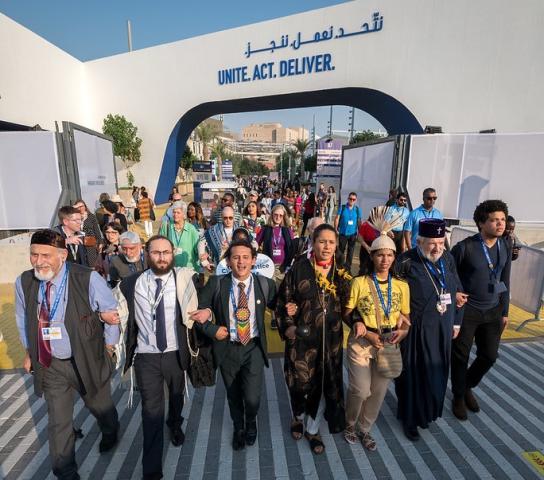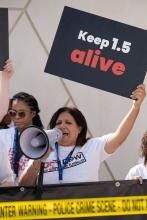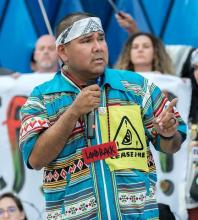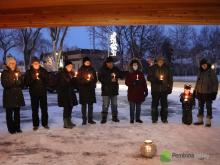Have the countries of the world moved forward on a viable path through this wilderness?

Simon Stiell, Executive Secretary of the UN Framework Convention on Climate Change, began the second week of the United Nations Conference on Climate Change (COP28) addressing the plenary with this call to reality:
“Past 1.5 degrees [Celsius], and we are likely to irreversibly lose ice sheets. If they go, there will be a 10-metre sea level rise across the globe. This will flood central parts of most coastal cities and coastal areas, forcing hundreds of millions of people to relocate. Past 1.5, and we’re likely to lose all tropical coral reefs systems, which provide the sustenance and livelihoods to hundreds of millions of people. Past 1.5, models predict that in less than 50 years, 2 billion people will live in areas so hot they are beyond the human limit and are a threat to life. The transition we need to make is nothing compared to the one that will be forced on us if we let go of the 1.5 ambition.”

Add to this the impact of rising temperatures, the rise in active opposition and distraction created by the many fossil fuel lobbyists, corporate greenwashing, and some parties who want to continue “business as usual” and to expand and grow the very practices that create the climate crisis, and COP28 can feel very much like a wilderness.
A voice cries out: “In the wilderness prepare the way of the Lord; make straight in the desert a highway for our God.” (Isaiah 40:3, NRSVue)
As a virtual COP delegate during this Advent season, the questions arise: Who is preparing the Way of the Lord? Who is and how are they preparing a path for a new relationship with creation?
A few general observations and an example of each:
Numerous speakers in the first-ever Faith Pavilion lift up the role of faith

More photos are available in the Lutheran World Federation's COP28 - Dubai 2023 Flickr album.
“How can we encourage and support those who have to consistently go up against the wall?
“To speak truth to power to defend their communities, here where power is speaking untruth back to them. That’s the pastoral work I am doing here at COP.”
—Rev. James Bhagwan, General Secretary of the Pacific Conference of Churches, Faith Pavilion, in Faith on the Frontlines panel organized by ICSD and Greenfaith, speaking of his work pastorally accompanying the Pacific Islands negotiators at their Moana Blue Pacific Pavilion.
Truth-tellers exposing injustice
“The key issue is resources for [climate] adaptation. These [funds] must be given as grants, not loans. If you recklessly drive and crash into someone’s house, do you then loan them the money to repair it?”
—Rev. Nicta Lubaale, General Secretary of the Organization of African Instituted Churches, a Mission and Service partner, pushing for climate adaptation in the lead-up to COP28.
In one of our evening ecumenical delegation debrief sessions after a day of empty financial promises, he raised the compelling prophetic question and lament, “When will justice be done?”
Indigenous Peoples centring Mother Earth

“Everything in the cosmologies of Indigenous peoples, from protection of women, to use of languages, to use of spirituality, it all connects us back to this earth—to land. Stop taking land from Indigenous peoples. It is our very existence that is connected to it. The language that we speak. The clans that we come from. The medicines come from this earth. It is our mother. At this moment of time, the number one solution to end climate disruption is to allow Indigenous people to stay on their land and watch how we live and live the same way.”
—Rev. Chebon Kernell, member of the Seminole Nation of Oklahoma and of Muscogee Creek heritage, United Methodist Church at Interfaith Talanoa dialogue.
Committed dedicated delegates bringing their message and sharing out
The thousands of delegates who attended in person and virtually included some affiliated with the United Church. You can find out more about their inspiring witness: the Rev. Chali Mfuta (Livingstone, Zambia), Shane Goldie (Taber, AB), Sarah Gingles (Moncton, NB), Janet Gray (Victoria, BC, through Climate Action Network), and Deb Walker (Vancouver, BC, through Christian Climate Observers).
Community-based vigils and action
“With recent droughts and drying-up wells, the signs of climate change are here. Candles for COP28 vigil was an opportunity for us to gather for hope, connection, and community action. Together we can make a greater impact.”
—Rev. Carrie Martens, St. Paul’s United, Morden, MB.
Candles for COP28 vigils calling for attentiveness and climate action were held in Penticton, Burnaby, Parksville, Osoyoos, Lacombe, Calgary, Morden, Ottawa, Toronto, Cobourg, Stone Mills, Waterloo, Guelph, London, Saint Laurent, Halifax, Wolfville, and even Livingstone, Zambia.

Those who wait for the Lord shall renew their strength; they shall mount up with wings like eagles; they shall run and not be weary, they shall walk and not faint. (Isaiah 40:31, NRSVue)
As COP sessions closed and decision was gaveled, one is left with the question: Have the countries of the world moved forward on a viable path through this wilderness?
On the first day of COP28, the decision to operationalize the Loss and Damage Fund, long sought by communities experiencing devastating non-adaptable climate impacts, was established. And yes, for the first time ever, nations agreed to move away from fossil fuels, calling for “transitioning away from fossil fuels in energy systems in a just, orderly, and equitable manner.”
Achieving this aspiration of a just, orderly, and equitable transition away from fossil fuels though, requires significant, dependable, and ambitious climate financing from the Global North and the enforcement of agreements that were sorely lacking in COP’s final text.
Many parties talk the talk, but what is needed are binding commitments, a reorientation, and dollars to walk the talk. There is a bit of a path, but in the words of Simon Stiell, we need to “teach climate action to run.”
As leaders, negotiators, and delegates return to our national, regional, and community contexts, I wonder:
- What is it that is holding us individually and collectively back from the full-on sprint to the transition that we need? That the earth needs?
- Do we let the vulnerability that this crisis evokes in us unconsciously make us dig our heels into the status quo, or can we use this vulnerability to birth a new way rooted in justice and interdependence—binding ourselves not to old ways, but to God, to creation, to our siblings, and to new ways of being?
I am about to do a new thing; now it springs forth; do you not perceive it?
I will make a way in the wilderness and rivers in the desert. (Isaiah 43:19, NRSVue)
—Lori Neale, Network Coordinator with the General Council Office, was a virtual delegate to COP28 accompanying a wonderful team of young adult delegates: Shane Goldie, Sarah Gingles, and the Rev. Chali Mfuta. To invite members of the delegation to share their experience, contact .
For more reflection and analysis on the outcomes of COP28, you are encouraged to read the media releases of organizations we are members of and collaborated with at COP28: ACT Alliance and Climate Action Network Canada.
The views contained within these blogs are personal and do not necessarily reflect those of The United Church of Canada.